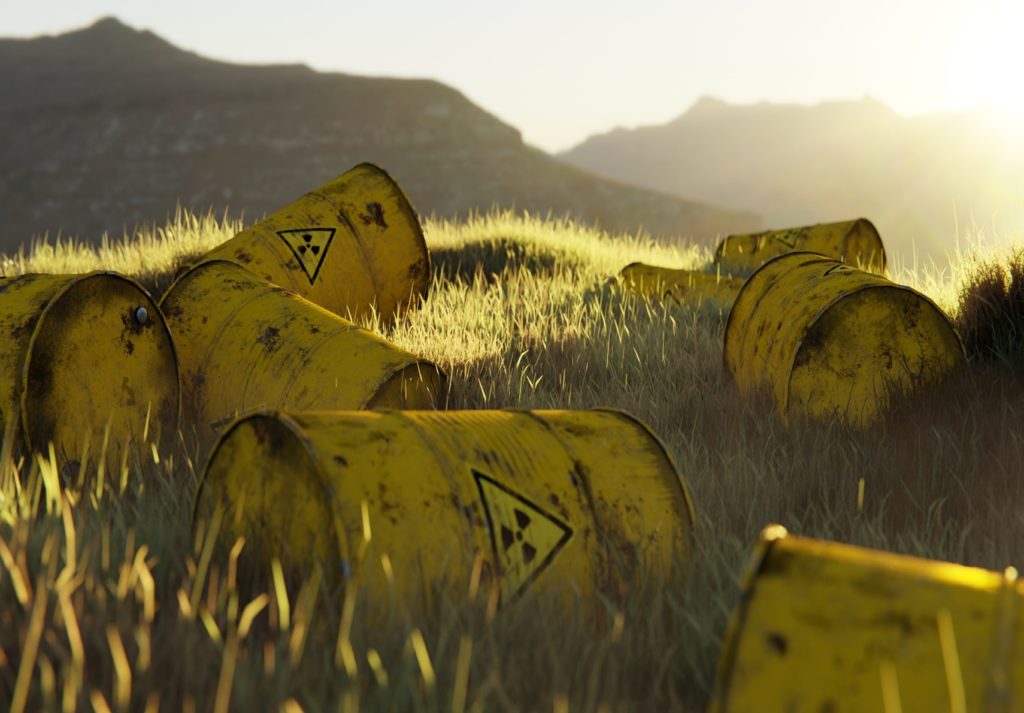
I learned this today. High energy radiation or long exposure to radiation can damage the DNA in cells and cause radiation sickness.
What is radiation? Radiation is energy that radiates from a source and travels through space at the speed of light. It travels as a wave or as particles and has an electric field and a magnetic field.
There are two types of radiation: non-ionizing and ionizing. The difference is the amount of energy that the radiation has. Non-ionizing radiation has enough energy to move atoms or molecules around, but it doesn’t have enough energy to remove electrons from the atoms. Radio waves, infrared, visible light, and microwaves are examples of non-ionizing radiation. Non-ionizing radiation has a lower amount of energy than its ionizing form, which means it has a longer wavelength.
Ionizing radiation has far more energy, which means it has a much shorter wavelength. Examples of ionizing radiation are alpha particles, beta particles, gamma rays, and X-rays. Ionizing radiation has so much energy that it can knock the electrons out of atoms, and this is called ionization. This is the type of radiation that is dangerous.
Alpha particles are very heavy, and they are released when heavy elements decay, such as uranium and radium. They have a lot of energy but, because of their mass, they use up this energy pretty quickly and cannot travel very far away their source. They are generally not dangerous because they don’t have the energy to penetrate human skin. However, if they are breathed in, they can be absorbed through the lungs and are dangerous then.
Beta particles are smaller than alpha and can move further through the air. They are released from unstable elements such as tritium, carbon-14, and strontium-90. They are usually stopped by a layer of clothing but are also dangerous if inhaled or swallowed.
X-rays have more energy than alpha and beta radiation. They are produced when charged electrons or ions with enough energy hit something else. X-rays have enough energy to travel through the human body, but they are stopped by the calcium in bone. A layer of lead will also stop X-rays.
Gamma rays are pure energy and are weightless. They have the most energy of all the types of radiation and the shortest wavelength. They are produced by radioactive decay of atomic nuclei. They will pass right through the human body. It takes 40 cm of lead to completely stop gamma radiation. If you don’t have any lead, then 201 cm of concrete or 420 cm of water will do the trick.
So, what causes radiation sickness? It is caused when the energy from the radiation enters the cells and damages parts of the cell. This damage depends on how much radiation is absorbed by the body and for how long. A very short blast of a powerful radiation, such as an X-ray, is harmful. However, being exposed to the X-ray for a longer period of time would be dangerous.
The radiation damages the cells in our bodies in two ways. When the high energy radiation enters the cells, it imparts some energy to the electrons that float around the atoms in our cells. These highly charged electrons bounce all over the place and damage everything they come into contact with. The second way it damages our cells is through the DNA. It affects the structure of the DNA and causes some of the strands to break.
If the dose of radiation is low and short, our body is quite able to recover and repair the damage. If the dose is higher, the damage can be too much to repair. Broken DNA can get passed on and become cancerous. The radiation harms the cells that divide rapidly the most. Places like the bone marrow and the lining of the intestines. The bone marrow cells rapidly divide to produce blood cells and the lining of the intestine has to continually renew itself to withstand the rigors of digesting and absorbing food. Both of these places can be damaged by radiation. They can either stop producing the cells they need to renew, or they can start producing damaged cells, which is how cancer begins.
There is no known cure for radiation sickness. There are some drugs that can remove radiation from the system, but there is no cure once enough cells have been damaged. Some people can recover from mild doses, but the greater the dose, the higher the likelihood of mortality becomes. At over 500 rads, (5Gy), mortality is pretty much guaranteed. In the Chernobyl disaster, some of the workers received that dose of radiation in under a minute.
So, ionizing radiation causes sickness because it energizes electrons which damage the cell, and it damages the DNA. And this is what I learned today.
Photo by Recognize Productions: https://www.pexels.com/photo/nuclear-waste-barrels-on-a-grassy-field-7092145/
Sources:
https://www.cdc.gov/nceh/radiation/what_is.html
https://www.mayoclinic.org/diseases-conditions/radiation-sickness/symptoms-causes/syc-20377058
https://www.medicalnewstoday.com/articles/219615#what_is_radiation_poisoning
https://hps.org/publicinformation/ate/faqs/radiationtypes.html
https://www.epa.gov/radiation/radiation-basics
https://en.wikipedia.org/wiki/Radiation
https://www.cdc.gov/nceh/radiation/what_is.html
https://www.mayoclinic.org/diseases-conditions/radiation-sickness/symptoms-causes/syc-20377058
https://www.medicalnewstoday.com/articles/219615#symptoms
https://en.wikipedia.org/wiki/Non-ionizing_radiation
https://en.wikipedia.org/wiki/Ionizing_radiation
https://en.wikipedia.org/wiki/X-ray
https://en.wikipedia.org/wiki/Acute_radiation_syndrome
https://en.wikipedia.org/wiki/Gamma_ray
https://www.rerf.or.jp/en/about_radiation/how_radiation_harms_cells_e/
https://www.env.go.jp/en/chemi/rhm/basic-info/1st/03-02-04.html

Pingback: #368 Is irradiated food safe? - I Learned This Today
Pingback: #373 Could nuclear fusion power the Earth? - I Learned This Today